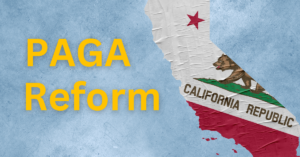 Following the recent reform legislation that significantly modifies PAGA, employers should begin to take proactive steps to minimize or eliminate potential liability with the litany of potential labor law violations which could give rise to a PAGA lawsuit.
Following the recent reform legislation that significantly modifies PAGA, employers should begin to take proactive steps to minimize or eliminate potential liability with the litany of potential labor law violations which could give rise to a PAGA lawsuit.
A BRIEF OVERVIEW OF THE “NEW” PAGA
When Do the Changes to PAGA Become Effective: The changes to the law became effective July 1, 2024.
Does the New Law Apply to Pending Claims or Lawsuits: The new law does not apply to existing cases. The changes to PAGA will only apply to cases where the notice to the Labor Workforce and Development Agency (LWDA) was submitted on or after June 19, 2024. Claims that were filed prior to June 19 unfortunately remain subject to pre-reform PAGA rules.
Reduced Penalties:
- Subsequent Penalties: The PAGA penalty was $100 for an initial violation and $200 for a subsequent violation. Plaintiff’s attorneys always sought to enforce the “subsequent” penalty amount for each pay period other than the first one in the PAGA period. The reform clarifies that the default $100 penalty applies to all violations unless:
- A court or the Labor Commissioner finds that the employer’s practice or policy violated the law within the last five years, or
- A court determines that the employer acted maliciously, fraudulently, or oppressively.
- Wage Statement Penalties: The reform bill sets reasonable caps for technical violations of the wage statement law:
-
- Wage Statement Cap 1 ($25): If an employee can easily determine accurate information from the wage statement alone, the penalty is capped at $25 per employee per pay period.
- Wage Statement Cap 2 ($25): If the only violation is failing to list the employer’s name and address accurately, and the employee would not be confused or misled about who their employer was, the penalty is capped at $25.
- Wage Statement Cap 3 ($50): If a wage statement violation resulted from an isolated and nonrecurring event that lasted the lesser of 30 consecutive days (for employers paying bi-weekly) or four consecutive pay periods (for employers paying weekly), the penalty is capped at $50.
-
- Weekly Payroll Not Penalized: Because PAGA penalties are based on each payroll period, this resulted in penalizing employers who pay weekly. The bill reform reduces the penalties by 50% for employers who pay weekly.
Changes to Standing Requirement: A PAGA plaintiff must now have personally experienced each specific Labor Code violation(s) they are seeking to recover on a representative basis. Previously, pursuant to case law, an employee could pursue penalties affecting other employees, even if the Plaintiff had not been personally affected by these violations.
CHANGES TO THE PAGA PENALTY FRAMEWORK:
- Before receiving a PAGA notice or a Request for Personnel Records: If an employer can show it took all reasonable steps to comply with the law before it received a PAGA notice or request for personnel records, penalties are capped at 15%.
- After receiving a PAGA notice: If an employer can show it took all reasonable steps to comply with the law within 60 days after receiving a PAGA notice, penalties are capped at 30%. (Courts have discretion to exceed this cap if they believe that to do otherwise would result in an award that is unjust, arbitrary, and oppressive, or confiscatory.)
Reasonable Steps To Reduce Penalties: New PAGA provides that if an employer undertakes some or all the following steps, they have a good chance of reducing their potential liability:
- Audits: Conduct periodic payroll audits and take action in response to the results of the audit;
- Policies: Disseminate lawful written policies to managers, supervisors, and employees to educate everyone on meals, breaks, recording time, monitoring the workplace, etc.;
- Training: Conducting training for supervisors and managers on how to ensure the company is in compliance;
- Corrective Steps: Take appropriate corrective action with regard to supervisors who did not follow the rules;
- Other Considerations: In making a determination whether an employer has taken “all reasonable steps,” a court will consider the totality of the circumstances and take into consideration the size and resources available to the employer, and the nature, severity, and duration of the alleged violations.
CURING VIOLATIONS
To lawfully cure certain violations and avoid PAGA penalties, an employer must not only correct the underlying conduct giving rise to the violation but also make employees whole.
The PAGA reforms expand the type of violations that an employer can cure to include failure to provide meal and rest breaks, minimum wage and overtime violations, expense reimbursements, and additional wage statement violations.
To cure a violation to make the employee “whole” (as if the violation never occurred), the employer should undertake the following:
- Compensate employees for any unpaid wages owed during the 3-year statute of limitations period;
- Pay interest on the amount of wages owed (7% rate) and any liquidated damages required by the relevant statute;
- Pay reasonable attorney’s fees and costs, to be determined by the LWDA or the court.
Curing Inaccurate Wage Statements: Provide corrected wage statements to employees, or, if the only error is the employer’s name, by simply providing a “summary” of the error, the corrected information, and the pay periods in which the error occurred).
Small Employers (less than 100 employees) Ability to Cure: Beginning October 1, 2024, employers with fewer than 100 employees have 33 days from receipt of the PAGA notice to submit a confidential proposal to the LWDA describing a plan to cure the violations alleged in the PAGA notice, and the reform bill sets a procedure overseen by the administrative agency LWDA to implement an effective cure.
Large Employers (more than 100 employees) Ability to Cure: Effective immediately, large employers who are sued under PAGA may request a “stay” of the legal proceeding and request an early neutral evaluation conference with the court to review alleged violations, whether any have been cured or any proposed plan to cure the violations. The reform bill also contains a procedure for this process.
WHAT SHOULD CALIFORNIA EMPLOYERS DO NOW?

- Undertake proactive action to prevent or correct wage and hour violations before any claim is filed.
- Undertake prompt responsive action to correct and “cure” violations after being notified of a claim.
No Reason to Wait!
Employers are well-advised to conduct a thorough audit to determine if there are any problems that need to be addressed and cured. Training supervisors should also be put on the calendar to ensure that all “reasonable steps” are being taken before a claim arises.
Proactive preventative steps can significantly impact the amount of potential penalties faced later when an employee brings a PAGA claim alleging a violation.
This Newsletter is intended as a brief summary of employment law. While every effort has been made to ensure the accuracy of the information contained herein, it is not intended to serve as “legal advice,” or to establish an attorney-client relationship. If additional information is needed on any of the topics contained herein, please contact our office. All rights reserved. ©2024.
